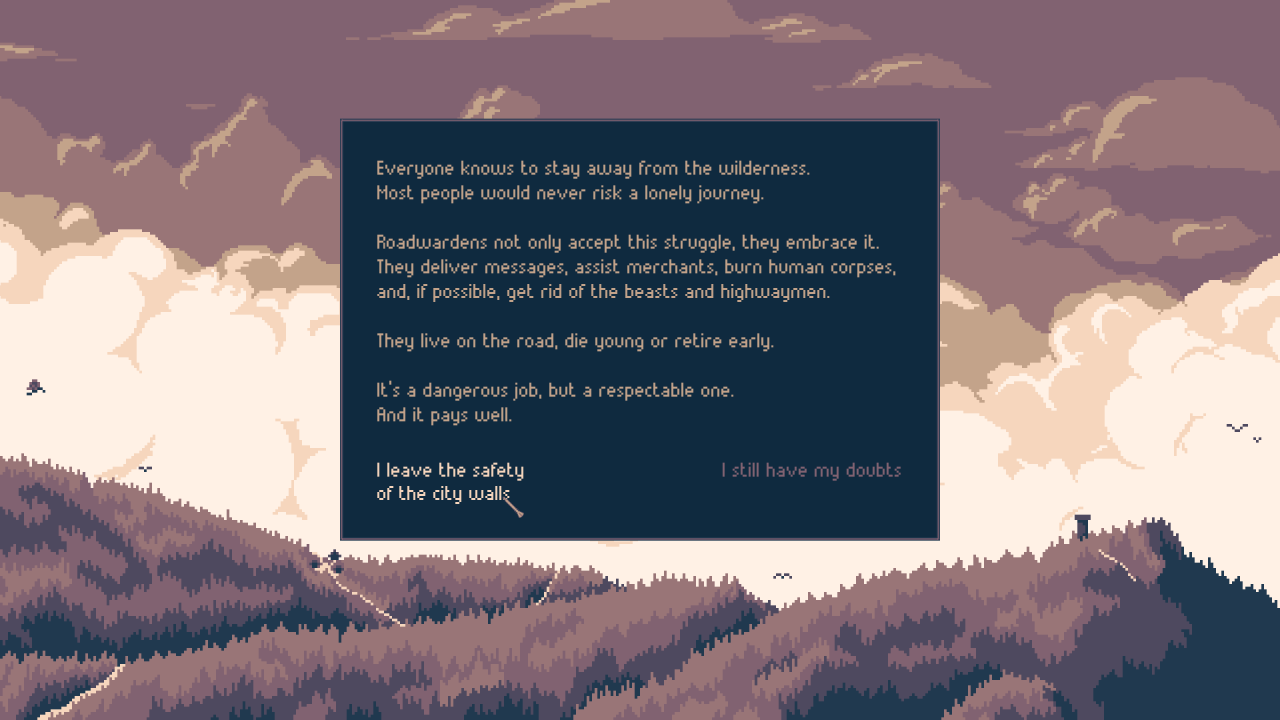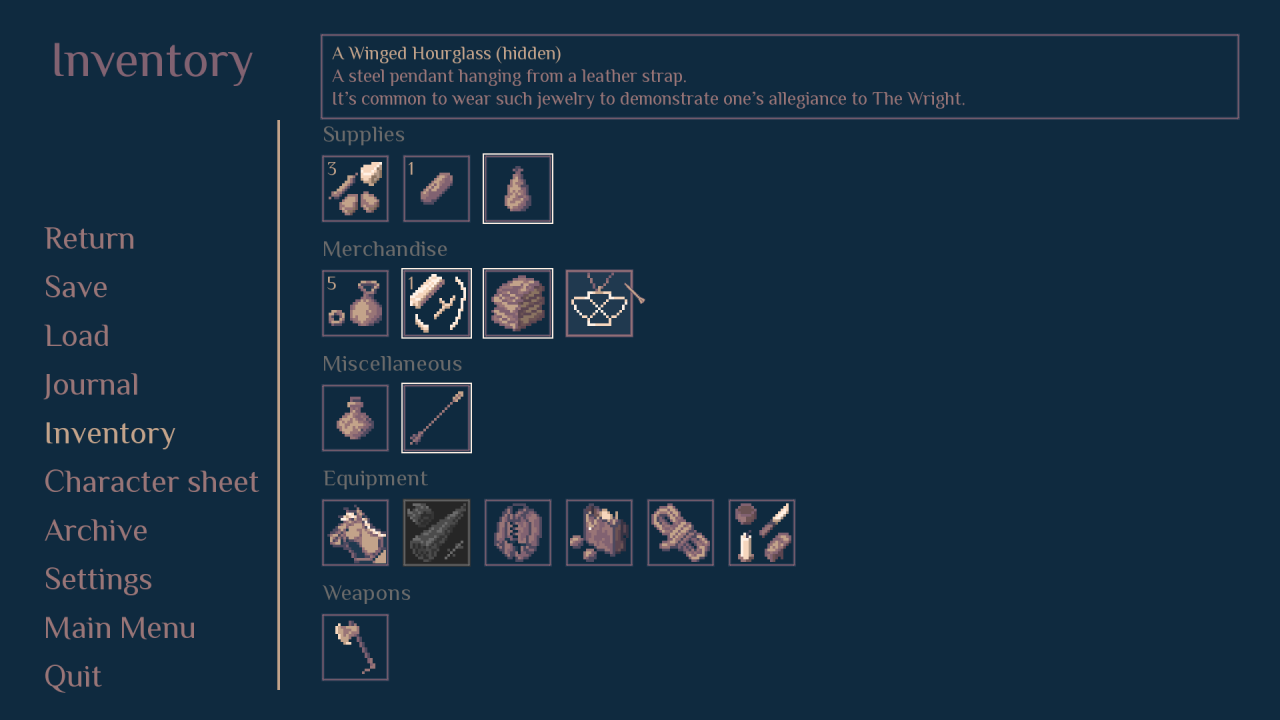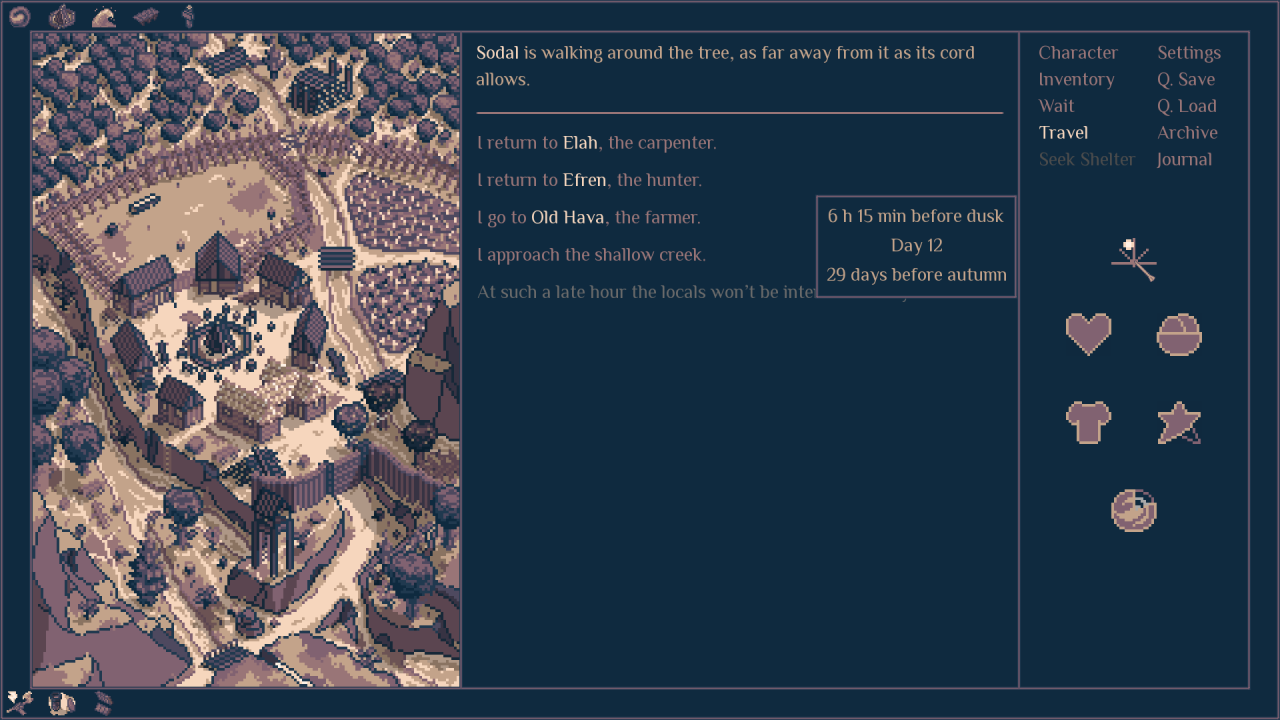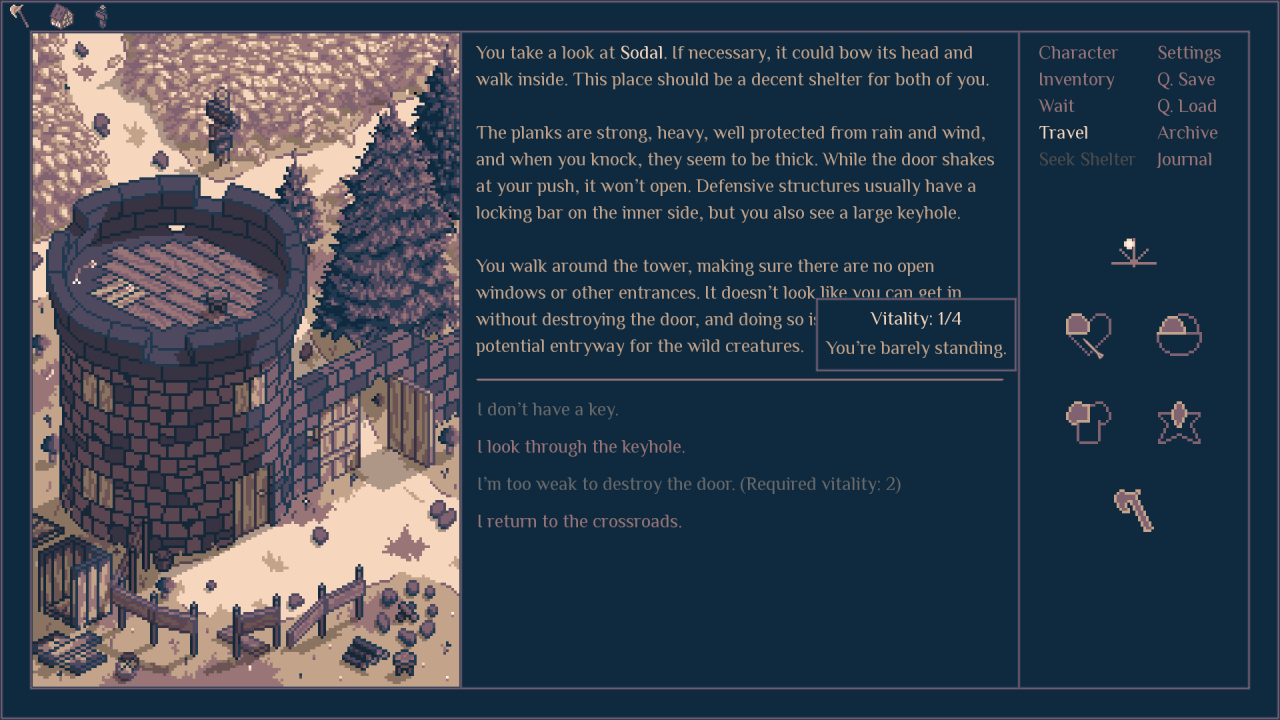A talented writer might intuitively aspire to create a novel or even a series of novels. Intuitively, that’s what writers have done for centuries. Now, though, we have this amazing new medium for storytelling called video games. What sets video games apart from books is player agency—seamlessly weaving storytelling and game design. Games today do this in various ways, such as cutscenes, voice acting, and even full-motion capture for that cinematic feel. But what about the printed word? While several games still lean on text, few do this the same way as the genre thought dead: text-based RPGs. Or text-based adventure. Whatever.
Roadwarden breathes life into this forgotten art by creating a vast world in a tiny peninsula. The game design, music, and visuals substantively contribute to this engrossing adventure, but let’s not kid ourselves: the writing is king. What is a roadwarden? A roadwarden is someone who acts as an ambassador for Hovlavan (“The City”) to those living humble lives in the wilderness. They carry messages, thwart bandits, conduct odd jobs, and get to know the land and its people. My impression is that they act like well-respected third parties but are frequently regarded as outsiders.
Your character—the Roadwarden—decides a goal at the start of the game. What do you aspire toward? Riches? Starting a guild? To move beyond a tragic past? Just to do good? This goal may influence how you, the player, act, though I am not sure it affects how the other characters interact with you. You also determine what class you want to play, choosing from a fighter, spellcaster, or alchemist. This is not your typical fantasy game, though it relies on some small tropes that the creator shapes with artistic license. I played as a fighter who starts with certain equipment and skills that assuredly helped me along the way. Had I chosen the other classes, I think my experience would have been about 80% the same: some people and scenarios would almost definitely play out differently with another class.

This is all minutiae, though. In the grand scheme of things, Roadwarden is about exploration, conversation, and preparation. At the start, players may be overwhelmed by how large this world is. I spent several hours on the first day (of the allowed 40 before I had to return home to Hovlavan) just mapping out the land. Not only was I fumbling about trying to get a feel for how hostile or friendly every location was, but I had to orient myself to the game’s systems and style of play. After I explored most of the locations, I zipped around on the map clicking landmark locations, whether village or place of interest, as my quests and personal goals dictated. Roadwarden throws a healthy helping of things to do at you, and it’s truly your choice how to solve each problem, in what order, and even if you want to solve the problem at all.
Almost every character in this game feels distinct from the others, with some key players clearly receiving greater detail than others. Nevertheless, everyone feels important to this world, contributing to the lore and mythos making Roadwarden engrossing, including the humble shopkeepers and artisans. Quests range from playing messenger and delivery man to monster cleanup and explorer. While the act that the quests require may not be anything novel, it’s the details of the quests that matter. For instance, I had to plant eight magical rods throughout the peninsula to assist a hermit mage, but not everyone’s cool with magic, hermits, or this particular person. So, figuring out how to accomplish this goal with each village or piece of wilderness became a unique challenge. Do I press someone further and strain my relationship with them, do I lie and sneak the rod in somewhere they won’t find it, or do I simply look for other opportunities to plant the rod? Maybe I give up on the quest altogether.
Other finer details play a meaningful role in one’s ability to relate to others, such as the roadwarden’s religion, health state, cleanliness, inventory, and conversation style. This is where the game design comes into play. While choosing where to go and how to talk to people is deeply satisfying, feels personal to the player’s choice, and can earn bold responses from the people of this world, Roadwarden is also a resource management game. Of course, if our hero loses all of his health, the game ends and you have to load a save, but this rarely comes into play; health serves as more of a finger-wagging mechanic that forces you not to take too many stupid risks or maintain hunger.
Managing a full or at least partially full stomach determines the quality of one’s sleep (which is also influenced by the quality of the bed), as well as the roadwarden’s ability to complete physical feats. Cleanliness influences how much people trust you and can open up new dialogue options while time pulls the whole thing together. Remember, you have 40 days to accomplish your goals and learn as much as you can about the peninsula before you must return to Hovlavan. This means traveling around—on horseback—takes time between destinations, so while zipping from one end of the peninsula to the other might get a specific quest completed faster, it’s not necessarily the most responsible use of one’s time. Want to eat a meal? That’ll be thirty minutes. Want to bathe? That’ll be another thirty minutes.

I could enthusiastically go into greater detail about how everything works together because I just love this game so much, but out of respect for your time, reader, I’d summarize all of this by saying the game’s systems and writing flow seamlessly well together. Roadwarden should be viewed as 80% writing, 20% gameplay. This ratio works well, though, because too much game would detract from what makes Roadwarden so utterly fantastic: the writing! This is going to sound weird, but the ample boring detail makes this a truly spectacular game.
You enter a run-down hut and observe a basket of wrinkled berries, a bundle of straw in a corner of a room, and a cracked, oblong clay pot resting on a dust-covered table along the far wall. An old woman enters behind you whose every wrinkle holds a secret story she keeps hidden in her heart beneath the woolen shawl draped over her skeletal shoulders. Yet she maintains a modest smile as she peers at you through squinted eyes. “Care for some water, Roadwarden? I don’t have wine or anything fancy like you’d expect in the city you come from, but it was drawn from the nearby creek with love, I assure you that,” she follows with a raspy giggle.
I’m doing the creator a disservice with that example, but while we may all doze off a bit reading about clay pots and wicker baskets, these sorts of details are brief enough so I didn’t want to skip the reading, yet also masterfully characterize what sort of place I’m in and who I might be talking to without any exposition whatsoever. This writer shows and rarely tells. They have somehow mastered the fine balance of saying enough without prattling on; they respect our time.

Not only that, but most interactions allow for multiple meaningful choices, including combat with animals and monsters. Roadwarden has an ecosystem that must be respected. Every pack of animals, giant predator, and sneaky hunter requires a different tactic, and that tactic isn’t always about fighting head-on. Some of these encounters may initially feel like guesswork—and they should be. You don’t know this land, its culture, or its people. After some time and mistakes, players learn how to handle specific situations or general encounters. What animal do I fight or run from, who do I trust, how much should I lie, what exactly should I spend my money on (be wise here!), etc.?
If I were to criticize—and am here to do that—Roadwarden has a few instances of narrative oversights and timeline missteps. For the vast majority of the game, the creator clearly considers all possible contingencies, and the writing and choices available reflect that; however, I ran into situations of discontinuity, especially near the end of my journey. Speaking of the end of my journey, I was dissatisfied with my ending. Not because things didn’t go well but because I distinctly made choices with people and villages that were not accurately reflected in the ending. How did the game pull all of the details of everything I did together throughout every single encounter and dialogue option, yet fall apart at the end? While this did not have a meaningful impact on my overall enjoyment of the game, having a poorly delivered ending like this is disappointing.
The visuals (typically maps of buildings) coupled alongside the text rarely matter and serve more as a still image to add flavor. Yet what flavor! The sepia theme couples with the somber, dark tones beautifully, and the pixelart exudes craftsmanship. Some might prefer a little more color or animation, but I honestly think that’s fussing a bit much for what this game has to offer. The font (yes, the font) is a perfect fit, which is important since Roadwarden requires a great deal of reading; I never slowed, yet I found the lettering far from basic.

Nick Roder, the composer, I’m not sure has done much else besides Roadwarden, but what a debut! Again consistent with the atmosphere, the music is almost always melancholic, meandering, pensive. Even during aggressive encounters, the beat livens up yet maintains its airy reliance on strings coupled with percussion. I’ve been listening to this soundtrack for weeks on Spotify. This sort of music is my vibe and gives Roadwarden a deeper sense of place. Even if you don’t typically go for this sort of music, the qualities it shares with the peninsula and its people are undeniable.
I haven’t encountered writing anywhere near as good as this since Disco Elysium, yet that isn’t to say one is better than the other. Roadwarden is sort of dark fantasy, while Disco Elysium is an irreverent inspection of human psychology, society, and the Apocalypse. At about thirty hours, I cannot complain about my time with Roadwarden. A part of me is terribly sad to say goodbye to this world and its people, but it certainly didn’t overstay its welcome; that’s important. While I experienced amazing successes, I also made horrible mistakes and oversights that the game punished tastefully and forcefully. I don’t need or want a perfect adventure where everything ends with a neat little bow on top, and Roadwarden delivers just that. Some mysteries were left unsolved, while others were solved a little too well. Succeeding is sometimes a form of failure. So much to chew on, and I am thankful for the adventure.



